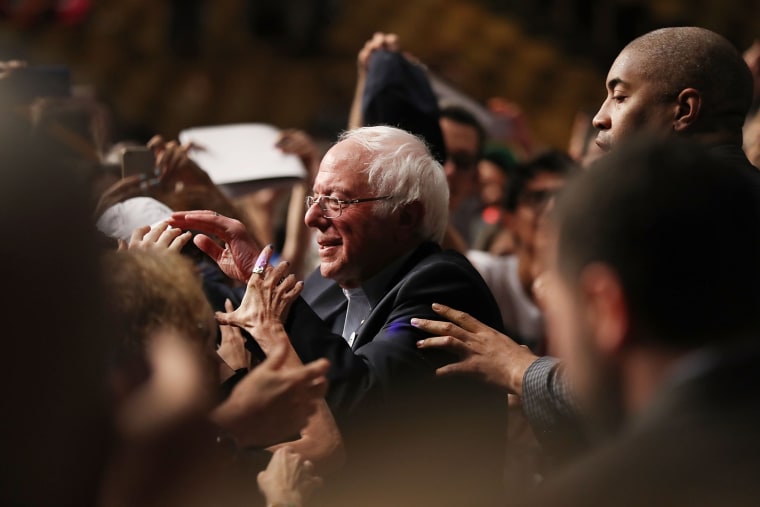MESA, Arizona — Is this what unity looks like? Maybe.
The reviews of the Democratic National Committee's national “unity tour” with Sen. Bernie Sanders and Chairman Tom Perez have been mostly negative. The Republican National Committee flooded reporters’ inboxes with bad headlines from the past week and even the liberal New Republic declared the effort “failed.”
There was plenty of grist for the critics: Boos for Perez; blowback from pro-choice groups for Sanders; and even, as if proving the curse, the collapse of an American flag behind Perez during a live interview on MSNBC.
The whole point of the latest endeavor was to put Perez, the new party chief, in front of Sanders’ most loyal supporters in key spots around the country to try to begin to earn their trust — even if that starts with letting them vent. Thousands turned out to see the Vermont senator in Portland, Miami and Las Vegas, where the tour concluded Saturday. Perez was the opening act; Sanders the closer.
Whether each of them likes it or not, the Democratic party and Sanders will need each other to survive in Donald Trump's America.
Sanders is the most popular politician in either party, several recent polls have found. More than four-in-10 Democrats — about 13 million people — picked him over Clinton in last year’s primary, and they’ve stuck with him with a loyalty that any politician would envy.
“I have been amazed at the energy Bernie Sanders has generated,” Perez said from the stage at the Mesa Amphitheater Friday as he gazed out at sea of T-shirts emblazoned with Sanders’ face.
“Anybody who goes against Trump is good with me”
So since being elected chairman in February — over the fierce objection of Sanders — Perez has been traveling the country as a human sponge to soak up the pent-up frustration of Democrats of all stripes.
Just as winning has a way of papering over internal divisions, losing has a way of exacerbating them.
At a black church in Detroit last month, congregants murmured “Amen” when an African-American woman came to the microphone to tell Perez, “We feel abandoned and we feel taken for granted.” Last week, steelworkers told him they didn’t know whom to trust anymore.
“I wanted to hear directly the frustration of people who feel the party hasn’t met their expectations,” Perez told NBCNews.com. “And for every boo-bird, there’s 400 people who want the party to succeed, have frustrations, and want to make sure that somebody is listening to them.”
Perez, who was vetted to be Hillary Clinton’s vice president and then in line to be her attorney general, probably didn’t expect to spend this year relitigating the 2016 Democratic primary. But if the party were already unified, there’d be no need for a unity tour.

As he reflected on the tumultuous week riding Sanders' coattails, Perez said he was satisfied with the outcome. “For me, this has been a great trip,” he said.
So Perez, and other Democrats, can do little but bite their lip about what the Washington Post dubbed “Bernie Sanders’ strange behavior” — his refusal to call himself a Democrat, or to call Georgia congressional candidate Jon Ossoff “a progressive,” and less-than-full-throated endorsement of Perez’ stewardship of the DNC.
“We must conclude that the current model, the current process by which the Democratic Party does business, is a failed process,” Sanders said minutes after Perez left the stage in Mesa. “That is why I am here tonight. Enough is enough.”
RELATED: Democrats vs. Trump: Full coverage
Still, for all his anti-joinerism, Sanders long ago concluded that he had to work inside the Democratic party, and to help it do what he thinks needs to be done.
He’s taken on a leadership role inside the party’s Senate caucus, and has a solid relationship with Minority Leader Chuck Schumer, aides say.
Even agreeing to participate in a tour to help the DNC — an organization he went to war with during the primary — was a concession, allies say, and if nothing else he and Perez have now forged a personal bond.
“There's very few people who have been running around the country quite as much as I have been, trying to bring people into the party,” Sanders said when asked about his commitment to the party Sunday on CBS’ “Face the Nation.”
Perez and Sanders both want “Berniecrats” to work with the party and vote for its candidates, even if those people don’t want to be called Democrats themselves.
Getting some will be easy.
“Anybody who goes against Trump is good with me,” said Roxanne Bowers of Phoenix said of Perez.
Others will be harder.
Paul Welshons, a Navy veteran who scrapes by financially by selling scrap metal, wrote in Sanders’ name on the ballot in November.
He loves Franklin D. Roosevelt and said he voted Democratic every year since 1970, but gave up on the party when no one went to jail for the financial crisis.
“I want to see that whole thing taken apart and dismantled,” he said of the party.
